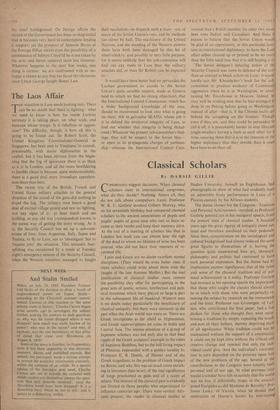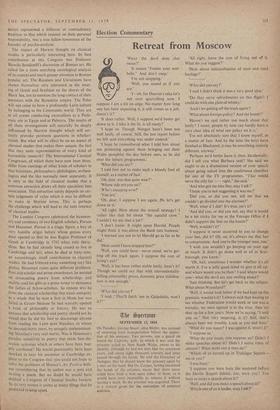Classical Scholars
By DARSIE GILLIE
CONGRESSES suggest decisions. When classical scholars meet in international congresses, what do they decide? Nothing. Above all, they do not talk about compulsory Latin. Professor W. K. C. Guthrie invoked Gilbert Murray, who on his seventieth birthday had compared classical scholars to the ancient associations of pupils and pupils' pupils of great men who met to burn in- cense at their tombs and keep their memory alive. At the end of a meeting of scholars like that in London last week you can almost hear the sigh of the dead to whom no libation of wine has been poured, who did not have their moment of re- covered life.
Latin and Greek are no doubt excellent mental disciplines. (They would. be even better ones if more scholars could write about them with the insight of the late Antoine Meillet.) But the real justification of classical studies must remain the possibility they offer for participatipg in the great acts of poetic, artistic, intellectual and poli- tical invention which have played so large a part in the subsequent life of mankind. Western man is no doubt today particularly the beneficiary of classical antiquity, but there were moments in the past when the Arab world was more so. There arc Greek inscriptions as far afield as Afghanistan, and Greek superscriptions on coins in India and Central Asia. The intense attention of a group of Japanese scholars was not only due to that final ripple of the Greek sculptors' example in the robes of Japanese Buddhas, but to the 'still living impact of Plotinus, expounded with a golden lucidity by Professor E. R. Dodds, of Horner and of the Greek tragedians, to the problem of Greek impact on Rome, and why this was so much more enrich- ing in literature than in art, of the real significance of kings proclaimed as gods and of a score of others. The interest of the classical past is evidently not limited to those peoples who experienced its influence centuries ago. There were several Afri- cans present; the reader in classical studies at
Ibadan University, himself an Englishman, had photographs to show of what had evidently been an admirably lively performance in Latin of 3 Plautus comedy by his African students.
The theme chosen for the Congress—Tradition and Personal, Achievement—resulted, as Professor Guthrie pointed out in his inaugural speech, from the present state of classical studies. A hundred years ago the great figures of antiquity stood iso- lated and therefore unrelated on their pedestals- Since then, concentration on the sociological and cultural background had almost reduced the same great figures to illustrations of it, leaving the question quite unanswered how art, literature, philosophy and politics had continued to have such personal expression. But the theme had by implication another significance, that of the value and sense of the classical tradition and of per- sonal achievement in it today. Professor Guthrie had stressed in his opening speech the importance . that those who taught the classics should always be in touch with those who were perpetually re- ne-wing the subject by research on the monuments and the texts. Professor van Groningen, of Ley' den, who contributed the final paper, had a line disdain for those who thought they were many taining a tradition by simply repeating the words and acts of their fathers, thereby depriving theni of all significance. While tradition could not be maintained without the support of a communitY' it could not be kept alive without the critical and creative change and renewal that only the indi' vidual could give. And the individual's contribu- Lion in turn depended on the pressure upon hint of the new problems of the age. Several of the contributions to the Congress were notably both personal and of our age. At what previous time would a scholar have felt so acutely that the world was no less, if differently, tragic to the emanci- pated Euripides as did Madame de Romilly? Pro- fessor Lesky, of Vienna, when he denied that motivation of Homer's heroes by intervening deities represented a different or contradictory tradition to that which insisted on their• personal responsibility, was a true fellow-townsman of the founder of psycho-analysis.
The impact of Marxist thought on classical studies is particularly interesting here. Its best contribution at this Congress was Professor Bianchi-Bandinelli's discussion of Roman art. He Called for a more searching sociological analysis of its context and much greater attention to Roman popular art. The Russians and Ukrainians have shown themselves • very interested in the meet- ing of Greek and Scythian on the shores of the Black Sea, not to mention the long contact of their ancestors with the Byzantine empire. The Poles will not cease to have a profoundly Latin culture by belonging to the Communist world. They are at all events conducting excavations at a Ptole- maic site in Egypt and at Palmyra. The results of all these investigations will naturally be deeply influenced by Marxist thought which will cer- tainly provoke pertinent questions in scholars' minds. But what will its effect be on an aspect of classical studies that makes them unique, the fact that they unite representatives of every kind of humanistic research? The International Classical Congresses, of which there have now been three, differ from meetings of other kinds of scholars in that historians, philosophers, philologists, archzeo- logists and the like normally meet separately. It is only in the field of classical studies that a common attraction draws all these specialists into association. This attraction surely depends on cer- tain judgments of value which it may be difficult to make in Marxist terms. This is perhaps the challenge which will lead to the next renewal of classical studies.
The London Congress celebrated the bicenten- ary and centenary of two English scholars, Porson and Housman. Porson is a tragic figure, a boy of very humble origin before whose genius every door opened so that he was Regius Professor of Greek at Cambridge in 1792 when only thirty- three. But he had already long ceased to live in Cambridge and left, when he died at forty-nine, an astonishingly small contribution to classical studies. He had frittered away something very like genius. Housman raises quite different problems. Poet and scholar and prose-swordsman, he insisted on dissociating poetry from scholarship; and mainly used his gifts as a prose writer to denounce the follies of fellow-scholars. Sp remote was he from the classical scholarship that treats antiquity as a whole that he won a first in Mods but was failed in Greats because he had scarcely opened a hook of philosophy or history. He was so anxious that scholarship and poetry should not be mixed that he did his best to discourage anyone from reading the Latin poet Manilius, to whom he devoted thirty years, by savagely underestimat- ing Manilius's very real merits. Was it Housman's peculiar sensitivity to poetry that made him dis- sociate activities which in others have been hap- pily combined? He would presumably have been shocked to hear his successor at Cambridge ex- plain to the Congress that you could not hope to solve the problems of Horace's Ars Poelica with- out remembering that its author was a poet and writing a poem. But no doubt he would have disliked a Congress of Classical Studies because by its very nature it unites so many things that he preferred to keep apart.



































 Previous page
Previous page